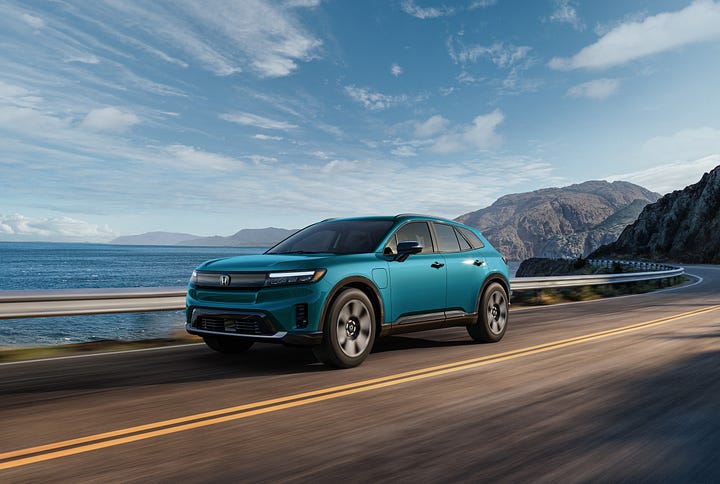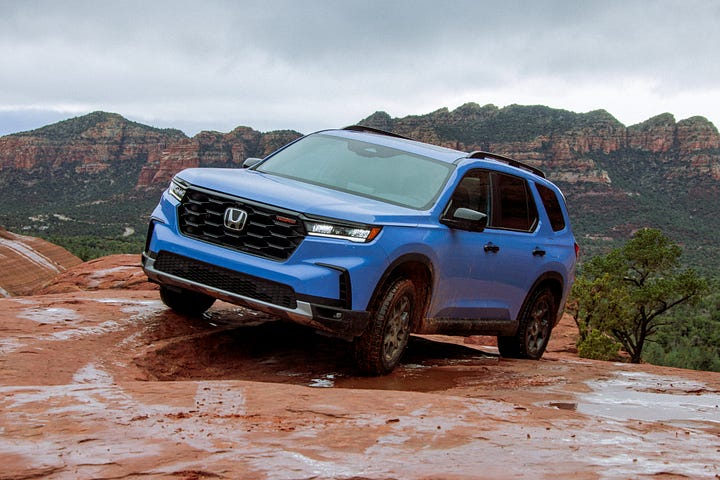How will Trump & Elon impact EV sales in their first 100 days?
Or, it's time to leap through those loopholes before it's too late.
Is it just me, or does it feel like the second Trump presidency has begun a month early? Or is it the first DonElon administration? Are we shipping them now? Should we try “Elonald”? Watching this week’s wild debate over the spending bill, which the president-elect and his techbro-in-chief derailed with overnight social media posts, the most damaging of which were fueled by misinformation, is like jumping into Doc Brown’s Delorean and dialing in Q2 2025. Great Scott, indeed.
For months, fossil fuel-loving Trump made rolling back “Biden’s EV mandate” one of his Day One priorities, something I began to delve into a few weeks ago. Now that we’re 30 days out from the Inauguration, and we’re starting to get a sense of how Trump might “collaborate” with the GOP majority on Capitol Hill, let’s talk about what the 47th president might do, and when, and how you should react if you’re considering buying an EV.
A Reuters report this week offered a sneak peek into the administration’s EV agenda, so I’m basing most of my assumptions off of their reporting.
What incentives might be on the chopping block?
Tax credits on EV purchases make up the cornerstone of EV legislation in the Inflation Reduction Act, and they are now the law of the land, having been passed by Congress and signed into law by President Biden. In a nutshell, this means qualified buyers of a specific list of new electric vehicles that meet certain criteria receive a $7,500 federal tax credit, and buyers of specific used EVs can get up to a $4,000 federal tax credit. (I highly recommend this NerdWallet article for a detailed breakdown of how it works, what buyers qualify, and what cars are eligible.)
Only new legislation passed by Congress could eliminate this tax credit entirely. However, there’s a lot that Trump could achieve via executive order to severely reduce the number of eligible buyers and vehicles that qualify for these tax credits, and he could get started on Day One. For example:
The current law only allows the tax credit on SUVs/crossovers under $80,000 and sedans under $55,000; Trump could drop those numbers.
He could slash the household income limits for buyers, reducing the pool of eligible owners.
He could tighten already strict regulations about the vehicles’ manufacturing locations and the origins of their battery materials, ruling out specific vehicles for the tax credit.
And, he could potentially make all of these decisions in a manner that benefits vehicles made by his pal Elon Musk at Tesla.
Sounds…not great. Here’s even worse news.
One of the best deals going in EVs involves leasing. Thanks to a loophole in the current tax credit policy, any buyer, regardless of eligibility, can take advantage of the $7,500 tax credit when they lease an EV, rather than buying it outright. Since the leasing company technically owns the vehicle, they are able to claim the tax credit and pass the savings along to the lessee. And many pundits recommend lease vs. ownership not only for the savings, but because the technology is evolving so rapidly and some drivers will want to upgrade to the latest model once their lease is up, much like people upgrade their smartphones.
Unfortunately, this loophole appears to be an easy target for executive action. Trump could quickly work with his Treasury Department or the IRS to restrict or eliminate any usage of the EV tax credit on leased vehicles.
Normally, one could expect that major regulatory changes would require public comment periods and review cycles which would take months, or even up to a year. But the Reuters article mentioned that Trump’s administration plans to claim that these changes in EV policy have a national defense rationale — this reads to me like a tactic designed to fast-track his potential executive orders.
What does it all add up to? It has been looking like the incentives to buy an electric vehicle would be getting very scarce, pretty quickly.
Budget Wars: A New Hope
At least I thought so until this week. In a development that truly surprised me, 34 GOP House members pushed back on Elonald’s last-minute interventions in the spending bill debate. The public pushback was shocking, especially in the face of unfiltered threats from both Trump and Musk. I took a look at the list of 34 and found that almost a fifth of them hail from states with significant investments in the EV space, plus an additional seven lawmakers from Tesla’s adopted home state of Texas (although, hilariously, the member of Congress representing the district where Tesla HQ is located is Progressive Caucus head Greg Casar, and the member representing Musk’s residential district is also a Democrat).
In the end, the House didn’t cave to Elonald’s demands and passed a spending bill without the duo’s debt ceiling recommendations. It’s anyone’s guess whether this backbone will remain sturdy once Trump is actually in the White House. But I was surprised and encouraged to find red state reps with EV ties among this early contingent of intra-GOP resistors.
EV buying advice for the next month
So what does this mean for you, potential EV buyer?
Trump politicized electric vehicles with vigor during his campaign, so my prediction is that he will go after the easiest, quickest win possible — like the lease loophole. Good news for you, then! There are some truly bonkers EV lease deals happening right now. If you live in Colorado, for example, you can walk out of a dealer tomorrow with a brand new Fiat 500e for zero down and zero monthly payments; you just pay the sales tax. Seriously!
Colorado is literally the Wild West of EV lease deals, but you can routinely score incentivized lease deals for mainstream EVs that are chopping 40% off the sticker price, and if you decide to keep the car after your lease concludes in 2-3 years, your purchase/”selling” price maintains those amazing discounts.
For instance, check out some Honda deals I found on the amazing Leasehackr forums. Compare the lease deals for the popular Honda Prologue EV and the Honda Pilot SUV with similar suggested sticker prices:
2024 Prologue EV Touring AWD, $289/month, $2,861 down, 36 months/10K miles a year;
MSRP: $56,550 / Selling price: $35,0252024 Pilot Touring AWD, $595/month, $2,861 down, 36 months/10K miles a year;
MSRP: $50,995 / Selling price: $47,500


The difference is wild: the monthly payment for the EV is about half, and the selling price is 62% of sticker, vs. 93% of sticker. This gives you a sense of the expected depreciation for the EV, which is a bit scary, but the lease deal is hard to beat — and many EVs come with complimentary charging packages or complimentary home charger installation.
Here’s my recommendation, then: If you’re interested in EV, and you can afford a sub-$300 monthly payment for the next 2-3 years, and you can charge where you sleep (or can charge conveniently where you’re being given free charging as part of your purchase), do it now, before Inauguration Day. The lease deals are most likely to vanish pretty quickly once Elonald takes control.
If you’re worried about what you’ll do in three years when your lease expires, you’ll still have a good option to buy the car you leased at a decent, discounted price. If you want something different, I am very, very confident that there will be plenty of capable used EVs on the market for good value. Just log onto any used car site today and you’ll find excellent deals on low mileage Nissan Ariyas or even venerable Hyundai Ioniq 5s.
Now, we just have to hope Elonald won’t funnel the remainder of the $7.5 billion allotted to EV charging over to defense spending or phallic space rockets — but that’s for another post.


